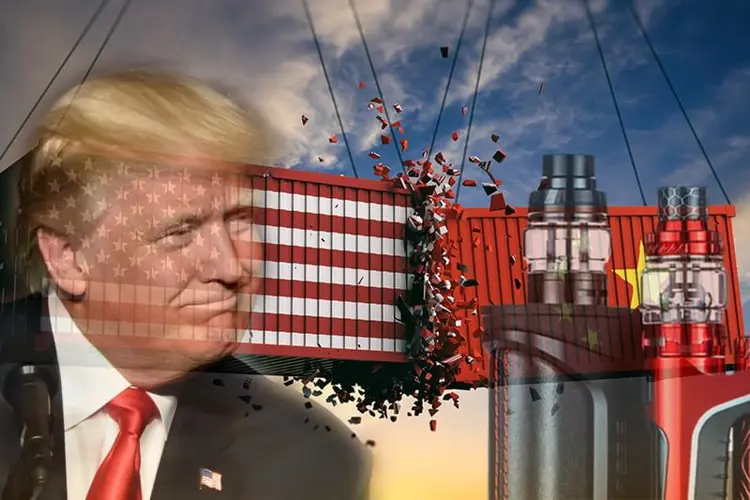American vapers and the industry that provides their vaping gear are being squeezed on multiple fronts. In addition to the daily news stories featuring politicians demonizing JUUL, and impending FDA restrictions on e-liquid flavors, now the Trump administration is imposing tariffs on Chinese vapor products.
The first round of tariffs on vapor products takes effect today, imposing a 25 percent tax on all shipments from China of e-cigarettes, mods, batteries, and similar devices.
Tariffs are import taxes added to products from another country, intended to create an economic benefit for competing American-made products. But, since there is no substantial production of vapor products in the United States, the tax will simply punish American importers, wholesalers, retail sellers, and ultimately vapers themselves.
“For the vast majority of American vapers, the choice is not going to be an American-made product versus a Chinese-made product with a 25 percent tariff,” says American Vaping Association president Gregory Conley. “It's only going to be the latter, which isn't much of a choice at all."
The tariffs will be assessed on finished products (not individual parts) being shipped from China beginning today. That doesn’t necessarily mean prices will increase immediately. But the smaller the business, the less likely it will probably be to attempt to absorb losses from the taxes for very long.
The effects of the tax will be felt more quickly at brick-and-mortar vape shops.
Geoff Habicht, president and co-founder of Smoking Vapor - manufacturer of the mini vape Mi-Pod and several other brands — says the effects will vary by product. “On products where the margins are lower (which is almost all hardware), we need to pass the entire increase along and it has a higher impact — because our cost to manufacture and the consumer retail price are already tight, so the retail increase will be close to 15-20 percent. On products with better manufacturing margin, the 25 percent tariff may only have a 8-10 percent increase at retail.” Habicht says that possible price concessions from parts suppliers, and a favorable exchange rate might help keep costs down too. Of course, the exchange rate could also work to raise costs.
“We do not think that customers will see the price increase immediately,” says MyVpro manager Josh Stephenson. Detroit-based MyVpro has an online retail and wholesale business. “Distributors and wholesalers may sell what is currently in their warehouse first, observe how the market is going, and decide which products they should import and what (if any) the price adjustment should be.”
“For most products listed on our websites,” says Stephenson, “we purchase directly from the manufacturer. With no distributors in between, we can get better control of the price to make customers feel less of a burden from these tariffs.”
Tariffs are aimed at giving American products a competitive advantage here at home.
The effects of the tax will be felt more quickly at brick-and-mortar vape shops. Most small shops have more than one link in the distribution chain between themselves and the manufacturer, which gives them less control over buffering the tariff costs. That means they’ll be hurt sooner too, since customers may shift purchases to online businesses that have lower operating costs.
James Jarvis owns six Vapor Station stores in Ohio, and an e-liquid manufacturing business. He’s also president of the Ohio Vapor Trade Association (OHVTA). Jarvis says some vape shops will feel the pain immediately. “Some companies will start to close stores — especially in more financially challenged areas, because this increase will put the cost to the consumer out of their price range and potentially push them back to combustible cigarettes.
“This tariff has forced me to make the decision to close one of my locations,” Jarvis added, “as I will not be able to absorb the cost in that location since that town is very economically sensitive.”
Tariffs are aimed at giving American products a competitive advantage here at home. But if there are no American-made vapor products, everyone loses: customers buy fewer products or wait to buy, retailers struggle, distributors and importers buy less from Chinese companies, and the factories in Shenzhen reduce R&D budgets and lay off workers. No one wins in this war.
Why can’t we manufacture vape gear in the U.S.?
There are multiple reasons China produces the vast majority of vaping hardware for the American market. First, that’s where the production of vape equipment began. Chinese factories have been mass-manufacturing e-cigarettes and other vape gear since 2003.
Some of the most famous Chinese manufacturers, like Joyetech and SMOK, have been producing vapor products for a decade or more. They know the business, all of the parts they need are also made in China, and they have product designers and engineers who have worked in the vape industry for years. That kind of experience and infrastructure doesn’t spring up overnight.
Opening a new factory to make vape devices on a large scale would be extremely expensive anywhere, but in the U.S. the cost of materials and labor is much higher than in China. "The few American vaping manufacturers do not have anywhere near the capabilities necessary to ramp up production to meet American demand,” says Greg Conley.
There is a second round of vape tariffs coming soon on parts like atomizers and coils.
“Unfortunately,” he added, “with the FDA deeming regulations less than four years away from shutting down thousands of small businesses, no bank is going to make the eight-figure investment that would be required to even begin to do large-scale manufacturing in America.”
Smoking Vapor opened a factory in China in 2015, after first considering building in the U.S. “We built our own factory in Shenzhen from the ground up to be able to maintain complete control of our supply chain and protect our IP,” said Geoff Habicht. “Unfortunately, we were not able to manufacture in the U.S. due to lack of components, problems with supply chain logistics for sub-components, and lack of e-cig specific manufacturing expertise here stateside.”
But it’s not only the cost and lack of available parts that prevent American companies from manufacturing domestically. The FDA Deeming Rule prevents any products made after Aug. 8, 2016 from being sold without an FDA marketing order. That requires approval of a multi-million dollar premarket tobacco application (PMTA) for each new product. No independent manufacturer will chance spending those millions, and certainly none would invest the effort and money to make obsolete pre-2016 products in a new American factory.
What can we do about the tariffs?
The tariffs will continue until President Trump and his advisers choose to end them. And while vapers may not have much power to pressure the administration to change its mind on the tariffs, business owners can make their dissatisfaction known to the supposedly pro-business administration and the Republican-majority Congress.
“I am hopeful at least — after the recent EU trade deal restructuring — that all this posturing by Trump and [Chinese president] Xi will de-escalate, and they can reach a middle ground that makes sense,” says Geoff Habicht.
"Small businesses impacted by these tariffs should reach out to the offices of their U.S. Congressman and U.S. Senators and ask them to work towards a solution," says the AVA’s Greg Conley. Conley testified at hearings held by the U.S. Trade Representative in July, telling the officials, “A rapid rise in the tariffs assessed on vaping products will only result in a tax increase on American businesses and consumers.”
Vapor Station owner James Jarvis reminds vape shop owners to join a trade association. “OHVTA is a part of the VTA (Vapor Technology Association), which has been actively fighting and testifying at tariff hearings on how damaging this will be to our industry, and to all the businesses both large and small.” He added that many VTA members submitted comments to the U.S. Trade Representative’s public docket.
The tariffs will be assessed on products being shipped from China beginning today.
There is a second round of vape tariffs coming soon on parts like atomizers and coils, and it appears those tariffs will also be 25 percent. VTA executive director Tony Abboud testified this week in Washington that the two rounds of tariffs will damage the vaping industry — but also turn back the public health gains vaping has provided.
“Driving up the price on vapor products only closes the price gap to regular nasty combustible cigarettes and makes it harder for people to stay off cigarettes,” says Geoff Habicht. “It will have negative effects on people’s lives and public health.”
Greg Conley agrees. “The worst result of these tariffs will be the sticker shock that will be felt by adult smokers considering switching to vaping,” he says. “As we know, the cost of vaping is already frontloaded, and making it higher will almost certainly lead some smokers to continue to smoke."
The Freemax REXA PRO and REXA SMART are highly advanced pod vapes, offering seemingly endless features, beautiful touchscreens, and new DUOMAX pods.
The OXVA XLIM Pro 2 DNA is powered by a custom-made Evolv DNA chipset, offering a Replay function and dry hit protection. Read our review to find out more.
The SKE Bar is a 2 mL replaceable pod vape with a 500 mAh battery, a 1.2-ohm mesh coil, and 35 flavors to choose from in 2% nicotine.
Because of declining cigarette sales, state governments in the U.S. and countries around the world are looking to vapor products as a new source of tax revenue.
The legal age to buy e-cigarettes and other vaping products varies around the world. The United States recently changed the legal minimum sales age to 21.
A list of vaping product flavor bans and online sales bans in the United States, and sales and possession bans in other countries.
















